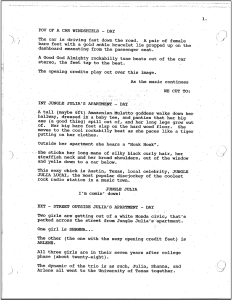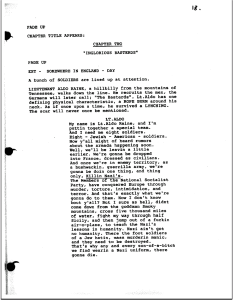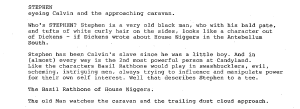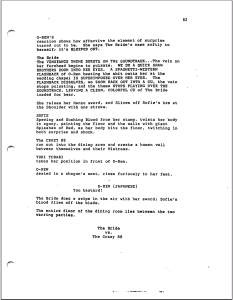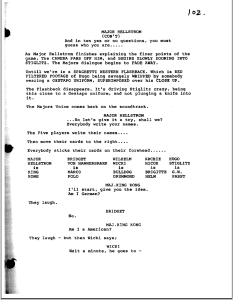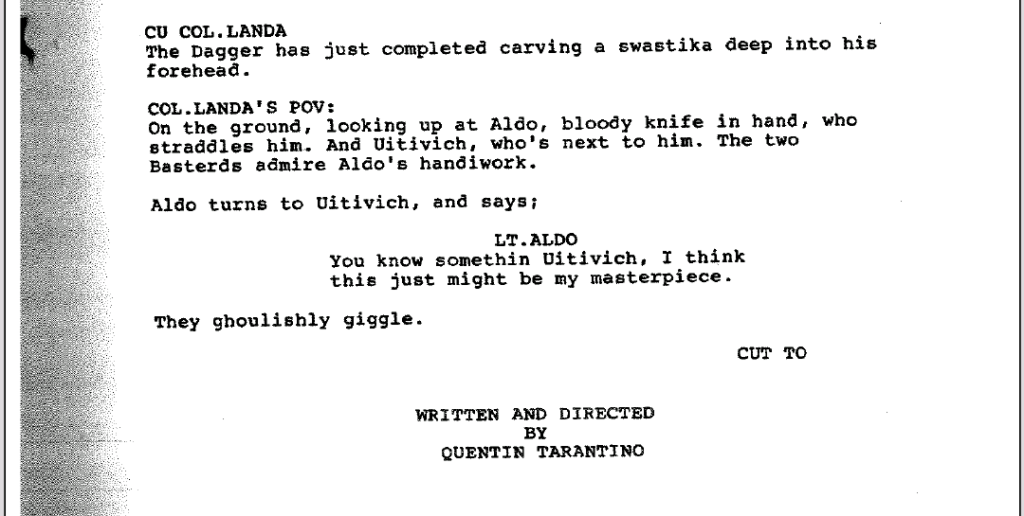
Mr. Tarantino reported no significant injuries from this extreme case of patting himself on the back. (From Inglorious Basterds.)
To say Quentin Tarantino is a controversial filmmaker would be an understatement. To some, he is the end-all, be-all of modern cinematic achievement, a shining prism through which the sum total of film history bends and refracts. To others, he is a problematic, culturally insensitive hack who thieves from a vast pool of talent and influences, forever hiding his crimes under the safe umbrage of homage. To the rest he’s a guy who makes movies, some of them cool, some of them not. Say what you will about him, he’s one of the few marquee filmmakers working today who can still sell a film on his name alone, and wherever speculation about his next move appears on the Internet, salivating is sure to follow. This was the case last week when an early draft of his latest project, The Hateful Eight, leaked onto the internet, after he’d only given it to “six fucking people!”
This isn’t going to be a detailed rundown on the script leak or the ethics of script leaks in general. Tarantino’s screenplays ALWAYS leak onto the internet before they hit the big screen. Nothing new here. Quentin is just pissed about this one because it wasn’t a final draft and he’s used to this happening to him while cameras are rolling; when the nerd in him can’t help but sympathize with his frothed-up fans dissecting his words on some forum or another. After all, it’s a holiday for the nerdy, script reading community when one of his typewritten, typo-ridden tomes ends up on the Net. Tarantino’s process is legend. He is notorious for distrusting computers, and so writes on typewriters and old word processors, only, of course, after writing drafts longhand, because he feels his pen is an antenna to the Gods.
Personally, I have read every Tarantino screenplay since Kill Bill (back when it was one movie) at least six months before getting to see it on the big screen. In none of those premature evaluation situations was my experience diminished. Part of the reason is that, increasingly, Tarantino is becoming something of a cinematic novelist. He writes and creates these dense, rich worlds, and directs them himself because he’s the only artist capable of translating them properly – one need only to watch True Romance, directed by Tony Scott (RIP,) or Oliver Stone’s Natural Born Killers to understand how much is lost when someone else takes the helm. Taxi Driver screenwriter Paul Schrader used to say, “a screenwriter is half a filmmaker,” and he was right, because ultimately, a screenplay is not a finished product, merely the blueprint for one. It just so happens that Tarantino’s strengths in this period of his career are leaning on the side of the scale with the clacking keys.
On multiple occasions, Tarantino has threatened to retire from making films altogether. Perhaps he’d be content to merely publish his scripts as he originally envisioned them, rather than continuously face the torture of having to gut them down into digestible, two hour meals. It would be a loss for cinema were this to come to fruition, yes, but the stories this man wants to tell are just as compelling on the page, which is something that can’t be said of a lot of writers working in Hollywood today. With the exception of the Coen Brothers, and probably Charlie Kaufman, very few screenwriters produce work that is satisfying to read. People write good scripts, even great ones, that can be turned into amazing films, but by its nature the structure of the screenplay isn’t designed to transcend into poetry. Screenwriting requires a terse economy of words and a streamlined formatting for efficient, easy reading. Producers need to be able to see if it can be a hit movie, and directors need to know where they should put the camera, and the set designer needs to know what kind of apartment to make. Like I said, “blueprint.”
Quentin Tarantino scripts are not like that. Oh, they get the job done and they generally perform all of the right functions, but there’s a warmth, a sort of genial charm, that makes them come alive, even without the aid of celluloid. In the 90s, Shane Black, the man who gave us Lethal Weapon, was famous for a lot of Blackisms, where he would break the fourth wall and speak directly to the studio-paid script readers he knew were reading his work. His sly asides were a breath of fresh air at the time and gave his work a real edge. A lot of copycats without his talent did the same thing, which sort of devalued the art of it all. Getting too cutesy can put off a director, who ultimately wants to be the originator of the film’s vision, and really just wants the writer to fill in the who, what, and where, not the color and the shot size and the line delivery. Tarantino’s work does both, only he doesn’t have to roleplay the malfeasance of the struggling screenwriter, since he knows he’s also the director.
In David Mamet’s book, On Directing Film, he speaks at length about how a screenplay’s action paragraphs (the prose between the dialogue and scene headers) should only depict what can be filmed, ie: “Here, we meet Jake, a young man, early thirties”; versus “Here’s Jake, a funny, likable guy with a nice smile that hides his underlying sociopathy.” The idea is to write images that can be filmed, and then edited together with other images to tell a story. Don’t TELL us Jake is funny and likable. SHOW us Jake being funny and likable. Tarantino is a man who likes to have his cake and eat it, too. Take for instance, this passage from Jackie Brown, introducing us to three of the film’s main characters:
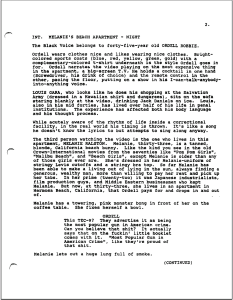
From Jackie Brown, Tarantino’s only adaptation, of Elmore Leonard’s Rum Punch
(click the image to expand)
Under the pen of a lesser writer, the surfeit of idiosyncratic details presented on this, only the second page of the screenplay, might be a signifier of insecurity. Concerned that telling us Ordell Robbie is wearing expensive clothes won’t get enough of his character across, the lesser writer might begin to yammer on about his back story or Who He Really Is On The Inside. Tarantino is able to give us loads of information, but all visual information we can glean from the screen. He has a pulp novelist’s eye for details, and it’s those details that give his film such flair. Even if you haven’t seen Robert DeNiro’s criminally unsung performance as Louis Gara, Tarantino comparing the world outside of prison to “a song [Gara] doesn’t know the lyrics to” is so evocative that one could reasonably extrapolate and see it in every line of dialogue, every moment of blocking, for the duration of the script.
As he’s become more confident in his own powers, Tarantino’s later scripts move further and further into this territory, filling each page with a richness that is undeniable. It frustrates me in screenplays when writers tell me things they could just as easily show me, because they’re taking short cuts, but Tarantino isn’t telling us these details because he’s not going to show us them in the story. He’s telling us them because the act of reading one of his scripts is a friendly, conspiratorial thing. It’s a special relationship he forms with the reader. As you turn the page, you can feel Quentin in the room handing you freshly typed sheets right after he’s handwritten the page number on them. Take this page from Death Proof, where he describes the relationship between the first group of doomed, leading ladies:
Everything about the way they are written hereafter supports that they’re in their late twenties and you could easily come to that conclusion on your own, but specifically pointing it out gives the feeling that we’re being told a story and not just reading the design for one.
Or this introduction to Aldo Raine in Inglourious Basterds:
We NEVER talk about that scar, but it serves to tease the mind, allowing the reader to fill in their own theories on Raine’s backstory.
Perhaps my favorite of these asides is in Django Unchained.
The formatting of a screenplay can be off-putting to people not used to reading them. The structure on the page helps keep scripts to the general guideline that one page equals one minute of screen time, and the use of white space is supposed to make the pages easier to breeze through, because the people in Hollywood who read scripts for a living have to read A LOT of scripts. Quentin, smartly, uses formatting to his advantage.
Here’s a big moment from Kill Bill, the first script he ever penned that was largely action based.
See how he focuses on each character? He doesn’t have to say “close on ____” because his wording implies the camera placement as well as the editing. The way “The Bride vs The Crazy 88” is centered? It’s not a title card or a chapter heading. That’s not normal to action beats in a script, but it signifies to the reader that some shit is about to go down.
Sometimes his use of formatting is functional, as in the infamous basement sequence in Basterds.
Lining up the characters with their “celebrities” in the parlor game is efficient and easier to take in than if he laboriously listed them out in a paragraph, and it also gives a strong sense of space, where the characters are blocked in the scene.
Having read The Hateful Eight, I can say that Tarantino has continued down this novelist path of screenwriting. I’m not going to get into the details of the script (because I’m not fucking Gawker), but it’s pretty damn good. Tarantino still chooses the most specific details to place a character in our minds, and sets the stage as cleverly as any of his peers. There’s still a winking side to the proceedings, with his copious references to other westerns or the medium he planned to shoot the film in, calling directly to how he envisions the frame. There’s still that exquisite, marathon-length dialogue that he’s learned to use to prolong suspense, rather than just be clever and musical for clever’s sake. It’s still fun to picture the actors he’s obviously written the parts for interacting with one another. You still read the first page and are blissfully unable to put it down until you reach the last one.
I personally don’t care if he ever films it or not. When Quentin Tarantino puts pen to paper and fingers to keys, he documents a fully realized world existing within his mind, and consuming that world on the printed page is just as enjoyable as consuming it on the big screen.
Whenever Tarantino finds a publisher to print this script, you should buy it. I know I will.

